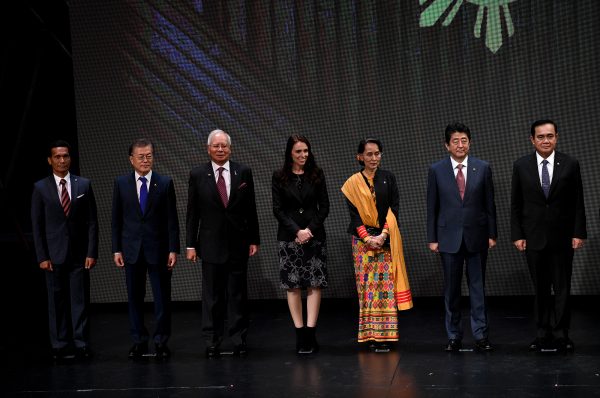Timor-Leste has made significant progress towards fulfilling ASEAN’s criteria of ‘ability and willingness to carry out the obligations of Membership’ as stated in Article 6 of the ASEAN Charter. It has attended ASEAN meetings, established diplomatic posts in all of the members’ capitals, attended international conferences such as the World Economic Forum and also hosted international and regional conferences such as the ASEAN Regional Forum.
While Timor-Leste will find it difficult to fulfil some membership obligations such as giving annual financial contributions and attending and hosting ASEAN’s hundreds of meetings, these problems are not insurmountable. Timor-Leste could be given a temporary discount on membership dues or be allowed to co-host annual ASEAN meetings. The Charter’s vague capability requirements also allow the goalposts to be moved every year, enabling some ASEAN members to block consensus on Timor-Leste’s membership. Strictly enforcing ambiguous criteria, coupled with the reality that it would probably take decades before Timor-Leste has enough officials to attend all ASEAN meetings, make it all but impossible for Timor-Leste to enter ASEAN.
But perhaps that is the point. Some ASEAN countries reportedly harbour a ‘negative mindset’ regarding Timor-Leste’s membership. Specifically, Cambodia, Laos, Vietnam and Myanmar (CLVM) worry that Timor-Leste’s admission could drain ASEAN’s limited resources that are currently used to help bridge the development gap among ASEAN members. This has led Singapore to express concern that a new member with economic limitations might bog down the progress of the ASEAN Economic Community (AEC).
Some members also worry that other more ‘liberal’ countries will use Timor-Leste as a venue to attack authoritarian governments, weakening the regional resolve to tread carefully on controversial issues that exist in member countries like Myanmar. Each of these concerns is serious but appear to be exaggerated.
First, Timor-Leste’s admission will not necessarily drain ASEAN’s coffers since most project funding under the Initiative for ASEAN Integration comes from its dialogue partners. Timor-Leste does need assistance in rebuilding its country but ASEAN is not even one of its top 10 donors. And even if Timor-Leste does need additional funds, its human development ranking (132) demonstrates that the country can effectively use these resources in general.
In terms of the AEC, Timor-Leste has increased trade with its neighbours and the government is implementing the Timor-Leste ASEAN Mobilization Plan to ensure that its legal, economic and fiscal systems comply with ASEAN standards. While staggering deadlines for new members does delay the full realisation of the AEC, ASEAN should instead be worrying about more consequential problems like non-tariff barriers.
Any deterioration in the political situation in Timor-Leste could also possibly distract ASEAN from its goals. Observers worry that notwithstanding the acceptance of the May 2018 election results, the divide between the President and Parliament continues to simmer. Still, ASEAN has never disbanded over the internal political turmoil of its members. A democratic Timor-Leste might actually welcome ASEAN’s constructive engagement if such a situation arises.
Finally, it is true that Freedom House and the Democracy Index have assessed Timor-Leste’s democratic system to be better than the ASEAN members’. Civil society organisations (CSOs) also have more freedom in Timor-Leste than other ASEAN members; but ASEAN has shown that it has been able to weather criticisms from CSOs so this is not a new challenge. The national leaders of Timor-Leste have muted their criticisms of Myanmar and Cambodia, and chosen practical engagement with Indonesia. Timor-Leste has fallen in line with ASEAN in terms of shielding its members from international criticism.
Unfortunately, ASEAN is ignoring serious geostrategic issues. US foreign and security policy are beholden to the mercurial Trump administration, the ‘Indo-Pacific’ concept challenges ASEAN’s long promoted ‘Asia Pacific’ concept and, most important, China is now a military and economic juggernaut. The Belt and Road Initiative (BRI) will continue to afford China further political and economic leverage over ASEAN countries. Cambodia broke consensus with ASEAN over decisions on the South China Sea due to China’s influence. Could the same happen to Timor-Leste?
China was the first to recognise Timor-Leste’s declaration of independence in 2002. China is Timor-Leste’s fourth and fifth largest import partner and export market, respectively. It has constructed highways, the country’s national electric grid and provided aid for the construction of buildings for Timor-Leste’s foreign and defence ministries. China is also developing the ports in Tibar Bay as part of the BRI. It is not in ASEAN’s interest for Timor-Leste to become too dependent on China, even if the latter is providing financial resources that could help Timor-Leste catch up with the rest of ASEAN.
So what does all this say about ASEAN? At 50, ASEAN is a mass of contradictions. It is ‘risk-averse’ despite its plans to build the three pillars of ASEAN Community. ASEAN members appear to be wilfully obtuse about Timor-Leste’s role in the current geostrategic environment despite China’s assertiveness. The ASEAN Community was envisioned to be built on democratic norms and human rights protection but the members refuse to rectify decades of turning a blind eye on the plight of the Timorese.
It is an ASEAN bogged down by institutional rules that have decreasing utility in the face of a changed international environment. Thankfully, Timor-Leste is no longer considered a ‘pebble in one’s shoe’. But its membership application is like the can that is perpetually kicked down the road. This says more about what ASEAN has become than what Timor-Leste can and cannot do.
Maria Ortuoste is Associate Professor of political science at California State University, East Bay.

